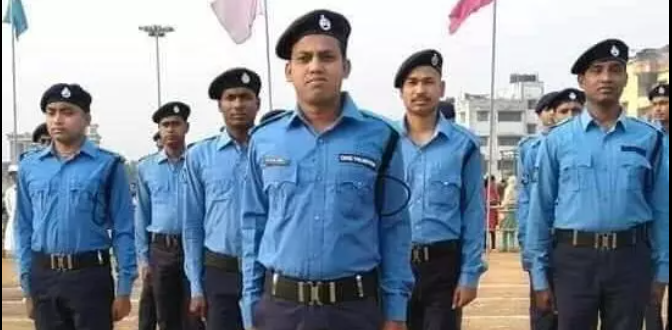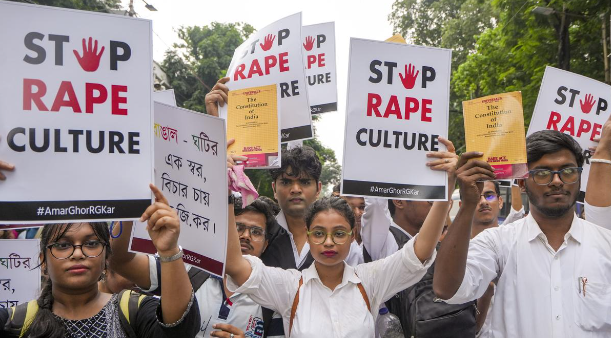The tragic Police Volunteers incident involving the rape and murder of a doctor at Kolkata’s R.G. Kar Medical College and Hospital has brought to light several issues concerning the role and functioning of civic police volunteers in West Bengal. Sanjay Roy, the main accused in the case, was a civic police volunteer, and his unrestricted access to the hospital has raised serious questions about the oversight, training, and accountability of such volunteers. This article delves into the specifics of this case, examines the broader implications of civic police volunteers’ involvement in law enforcement, and explores the historical context and controversies surrounding these volunteers in West Bengal.
Introduction
Civic police volunteers in West Bengal have been an integral part of the state’s law enforcement apparatus, assisting the regular police force in various duties. However, their role has often been a subject of debate, especially in light of incidents where these volunteers have been accused of overstepping their boundaries or being involved in criminal activities. The recent case involving Sanjay Roy has further fueled this debate, highlighting the potential risks associated with the deployment of such volunteers without proper oversight and accountability mechanisms.
The Incident at R.G. Kar Medical College and Hospital
The gruesome incident at R.G. Kar Medical College and Hospital in Kolkata shocked the state and the nation. Sanjay Roy, a civic police volunteer, was accused of raping and murdering a young doctor within the hospital premises. This crime has raised serious concerns about how Roy, who was not a regular police officer, gained unrestricted access to a sensitive area like a hospital.
How Sanjay Roy Gained Unrestricted Access
Sanjay Roy’s access to the hospital can be attributed to several factors:
- Lack of Proper Vetting: Civic police volunteers often do not undergo the same rigorous background checks and training as regular police officers. This lack of proper vetting may have allowed someone like Roy, with potential criminal tendencies, to be placed in a position of authority and trust.
- Poor Oversight: The management of civic police volunteers is often decentralized, with limited oversight from higher authorities. This can lead to situations where volunteers operate with a high degree of autonomy, sometimes without proper supervision, as was likely the case with Roy.
- Misuse of Authority: Civic police volunteers are given certain powers to assist the regular police force. However, these powers can be misused if not carefully monitored. Roy’s access to the hospital may have been facilitated by his misuse of the limited authority granted to him as a volunteer.
- Institutional Gaps: The incident also highlights institutional gaps within the hospital’s security system. The lack of stringent security protocols and coordination between hospital administration and law enforcement agencies may have contributed to Roy’s ability to gain access to restricted areas.

Historical Context of Civic Police Volunteers in West Bengal
Civic police volunteers have been a part of West Bengal’s law enforcement strategy for several years. Initially introduced to assist the regular police force in maintaining law and order, especially during large gatherings or festivals, these volunteers were seen as a cost-effective solution to augment the state’s police capacity.
Evolution of the Civic Police Volunteer System
- Introduction and Expansion: The concept of civic police volunteers was introduced in West Bengal as a means to involve local communities in maintaining law and order. Over time, the role of these volunteers expanded beyond crowd management to include tasks such as traffic control, assisting in criminal investigations, and even managing public protests.
- Training and Integration: While some basic training is provided to civic police volunteers, it is often not sufficient to prepare them for the complexities of modern law enforcement. The integration of these volunteers into the regular police force has also been inconsistent, leading to variations in how they are deployed and supervised across different regions.
- Role in Political Activities: In some cases, civic police volunteers have been accused of being involved in political activities, acting as enforcers for local political leaders rather than neutral law enforcement agents. This has led to allegations of bias and misuse of power, further complicating their role in society.
Previous Incidents Involving Civic Police Volunteers
The incident at R.G. Kar Medical College and Hospital is not the first time civic police volunteers have been involved in controversies. There have been several instances in the past where these volunteers have been accused of misconduct, excessive use of force, and even criminal activities.
Notable Cases of Excesses by Civic Police Volunteers
- Use of Excessive Force: There have been numerous reports of civic police volunteers using excessive force during public protests or while managing crowds. In some cases, their actions have led to serious injuries or even fatalities, raising questions about their training and the limits of their authority.
- Involvement in Criminal Activities: Some civic police volunteers have been found to be involved in criminal activities, including extortion, bribery, and assault. These incidents have tarnished the image of the civic police volunteer system and have led to calls for stricter oversight.
- Allegations of Political Bias: Civic police volunteers have often been accused of acting on behalf of local political leaders, particularly in rural areas. This has led to allegations of bias, with volunteers being accused of targeting political opponents or turning a blind eye to crimes committed by members of the ruling party.
The Role of Civic Police Volunteers in West Bengal
Despite the controversies, civic police volunteers play a crucial role in supporting the regular police force in West Bengal. Their involvement is particularly important in managing large-scale events, traffic control, and community policing.
How Civic Police Volunteers Aid the Government
- Augmenting Police Capacity: Civic police volunteers help to augment the capacity of the regular police force, particularly in situations where the police are stretched thin. This includes managing crowds during festivals, elections, and public protests, where their presence helps to maintain order.
- Community Policing: In rural areas, civic police volunteers often serve as a bridge between the police and the community. They help to gather intelligence, report crimes, and assist in the resolution of local disputes. This community policing approach is essential in maintaining law and order in areas where the regular police force may not be as present.
- Traffic Management: One of the primary roles of civic police volunteers is to assist in traffic management, particularly in urban areas like Kolkata. They help to regulate traffic, enforce traffic laws, and ensure that public transport runs smoothly. This support is crucial in a city known for its congested roads and heavy traffic.
- Disaster Management: Civic police volunteers also play a role in disaster management, particularly during natural calamities like floods or cyclones. They assist in rescue operations, provide relief to affected communities, and help to maintain order in disaster-stricken areas.
The Need for Reform and Accountability
The incident involving Sanjay Roy has underscored the need for significant reforms in the civic police volunteer system. Without proper oversight, training, and accountability mechanisms, the risk of similar incidents occurring in the future remains high.
Key Areas for Reform
- Enhanced Vetting and Background Checks: One of the most critical areas for reform is the vetting process for civic police volunteers. Enhanced background checks and psychological evaluations should be mandatory for all volunteers to ensure that individuals with criminal tendencies or other red flags are not placed in positions of authority.
- Improved Training Programs: The training provided to civic police volunteers should be significantly improved to include modules on human rights, conflict resolution, and the appropriate use of force. This training should be continuous, with regular refreshers to ensure that volunteers are equipped to handle the responsibilities of their role.
- Clearer Guidelines on Authority and Jurisdiction: There needs to be clearer guidelines on the limits of the authority and jurisdiction of civic police volunteers. This includes specifying the situations in which they can act independently and those where they must defer to regular police officers. These guidelines should be enforced rigorously to prevent the misuse of power.
- Increased Oversight and Accountability: The oversight of civic police volunteers should be strengthened, with regular audits and inspections conducted by independent bodies. A system of accountability should be established, where complaints against volunteers are investigated promptly, and appropriate action is taken.
- Community Engagement and Transparency: Building trust between civic police volunteers and the communities they serve is essential. This can be achieved through greater transparency in the deployment and actions of volunteers, as well as regular engagement with local communities to address their concerns.
Conclusion
The tragic incident involving Sanjay Roy at R.G. Kar Medical College and Hospital has highlighted the urgent need for reform in the civic police volunteer system in West Bengal. While these volunteers play a crucial role in supporting the regular police force, their involvement in law enforcement must be carefully managed to prevent abuses of power and ensure that they contribute positively to society.
The government of West Bengal must take immediate steps to address the gaps in the current system, including enhanced vetting, improved training, clearer guidelines, and increased oversight. By doing so, the state can ensure that civic police volunteers fulfill their intended role of aiding law enforcement while maintaining the trust and confidence of the communities they serve.
As West Bengal moves forward, the lessons learned from this incident must be used to strengthen the civic police volunteer system and prevent similar tragedies in the future. Only through comprehensive reform and a commitment to accountability can the state ensure that its law enforcement apparatus is both effective and just. ALSO READ:- Knife Rampage in Germany: Arrest of Suspect and Islamic State’s Claim of Responsibility 2024





